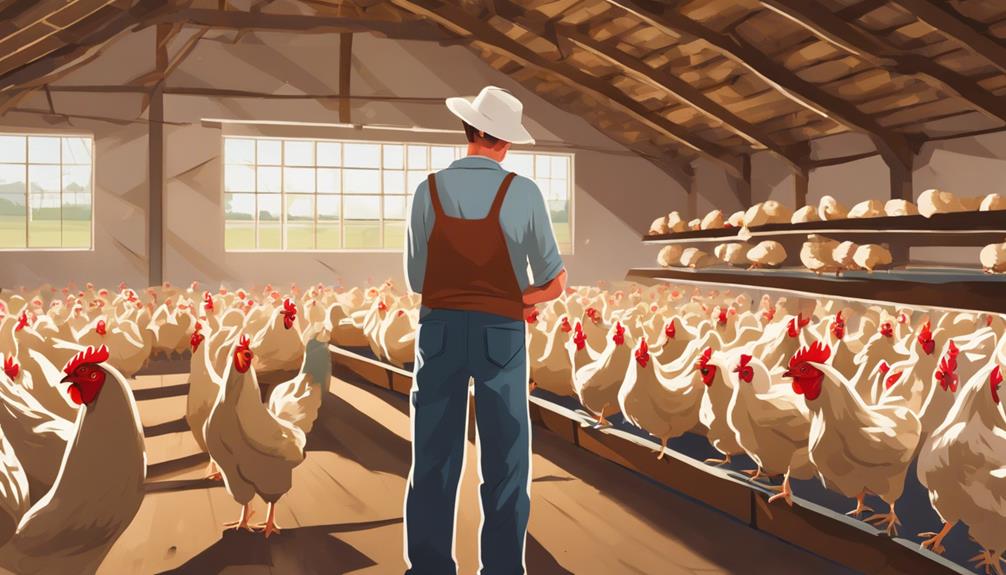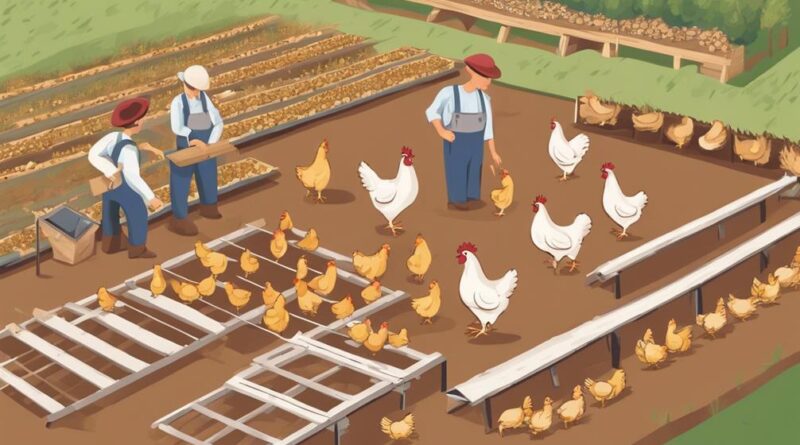Five Key Steps to Start a Broiler Chicken Farm"
Embarking on starting a broiler chicken farm involves these essential steps: Research market demand to understand consumer needs. Choose a suitable location with access to resources and good climate. Construct housing for optimal living conditions. Purchase quality chicks from reputable suppliers. Implement a feeding program meeting nutritional needs. Ensure health, hygiene, and growth monitoring. Develop marketing strategies to reach your target audience effectively. Each step plays a vital role in your farm's success, setting a strong foundation for your thriving business. Master these key steps to begin your journey into the world of broiler chicken farming.
Research Market Demand
To gauge the demand for broiler chickens in your area, start by conducting thorough market research. Pricing analysis is a crucial aspect to consider during this phase. Look into the current prices of broiler chickens in your area and neighboring regions. This information will help you set competitive yet profitable prices for your products.
Understanding consumer preferences is equally important. Investigate what consumers look for when purchasing broiler chickens. This could include factors such as freshness, size, organic options, or specific breeds. By aligning your products with consumer preferences, you can attract more customers to your broiler chicken farm.
When conducting your market research, consider visiting local supermarkets, butchers, and restaurants to observe the demand for broiler chickens firsthand. Talk to potential buyers and gather insights into what influences their purchasing decisions. Additionally, analyze online platforms and social media to understand trends and gather feedback from potential customers.
Choose Suitable Location
When selecting a suitable location for your broiler chicken farm, prioritize accessibility to key resources and infrastructure essential for efficient operations. Land preparation is crucial; look for a site with fertile soil that allows for proper drainage. Conduct soil tests to ensure it's suitable for supporting the growth of vegetation required for feeding your chickens. Additionally, consider the topography of the land to ensure it's suitable for construction and provides ample space for future expansion.
Climate considerations play a significant role in the success of your broiler chicken farm. Choose a location with a moderate climate that isn't prone to extreme temperature fluctuations. This will help in maintaining a comfortable environment for your chickens throughout the year. Ensure adequate ventilation and protection from harsh weather conditions, such as strong winds or prolonged exposure to direct sunlight.
Access to utilities such as water and electricity is essential when selecting a location for your broiler chicken farm. Ensure there's a reliable water source for both your chickens and the farm operations. Proximity to electricity sources will be necessary for lighting, heating, and other electrical requirements in the poultry houses. Additionally, consider the proximity to main roads for easy transportation of supplies and products. By carefully considering these factors, you can choose a location that sets your broiler chicken farm up for success.
Construct Broiler Housing
Constructing broiler housing requires meticulous planning to ensure optimal living conditions for your chickens. When considering housing design, it's essential to provide adequate space for the broilers to move around while also ensuring protection from predators and extreme weather conditions. The design should prioritize good ventilation to maintain proper airflow within the housing structure.
A well-designed ventilation system helps regulate temperature, humidity, and air quality, which are crucial for the health and growth of your broiler chickens. Proper ventilation can prevent the buildup of harmful gases like ammonia and carbon dioxide, reducing the risk of respiratory issues among the birds. Additionally, it helps control moisture levels, preventing issues such as mold growth and excess humidity that can lead to health problems.
When constructing the broiler housing, consider the orientation of the structure to maximize natural light exposure. Natural light not only benefits the chickens' well-being but also helps reduce energy costs. Ensure that the housing is well-insulated to maintain a comfortable environment for the broilers year-round.
Purchase Quality Chicks
For optimal results in starting your broiler chicken farm, prioritize sourcing high-quality chicks from reputable suppliers. Chick sourcing is a crucial step that sets the foundation for the success of your farm.
Here are key considerations to keep in mind when purchasing quality chicks:
- Reputable Suppliers: Research and choose suppliers with a proven track record of providing healthy and disease-free chicks. Verify their reputation within the poultry farming community to ensure reliability.
- Genetic Line: Consider the breed selection carefully based on your farm's goals. Different breeds have varying growth rates, feed efficiency, and disease resistance. Select a breed that aligns with your production objectives.
- Health Certification: Ensure that the chicks you purchase come with health certificates from a certified veterinarian. This documentation guarantees that the chicks have been properly vaccinated and are free from common diseases.
- Early Age: Aim to purchase chicks that are one day old for optimal growth potential. Young chicks are more resilient, adapt quicker to their environment, and have a higher chance of reaching their full genetic potential.
Implement Feeding Program
To ensure optimal growth and health in your broiler chickens, establishing a well-structured feeding program is fundamental. A proper feeding schedule is crucial to meet the nutritional requirements of your birds at different growth stages. Broiler chickens have specific nutritional needs to support their rapid growth and development. Starting with a starter feed high in protein (20-24%) for the first few weeks, you should then transition to a grower feed (18% protein) and finish with a finisher feed (16% protein) until market weight.
Monitoring growth performance and feed efficiency is essential in adjusting your feeding program. Keep track of the weight gain and feed consumption of your broilers to ensure they're on track for optimal growth. Adjust the feed amounts accordingly to maintain a balance between growth and feed efficiency.
Incorporating supplements like vitamins and minerals can also enhance the health and productivity of your broiler chickens. Consult with a poultry nutritionist to formulate the best feed ration for your flock based on their specific requirements. Additionally, providing clean and fresh water at all times is crucial for the overall health of your broilers.
Maintain Health and Hygiene
Maintaining the health and hygiene of your broiler chickens is paramount to ensuring their well-being and productivity on your farm. Here are some essential tips to help you maintain optimal health and hygiene practices, as well as prevent diseases:
- Clean and Sanitary Environment: Regularly clean the chicken coop, removing any droppings, leftover feed, and soiled bedding. Ensure good ventilation to prevent the buildup of harmful gases and pathogens.
- Provide Clean Water: Make sure your chickens have access to clean and fresh water at all times. Regularly clean and refill waterers to prevent contamination and the spread of diseases.
- Monitor Chicken Health: Keep a close eye on the health of your broiler chickens. Look out for signs of illness such as lethargy, decreased appetite, or abnormal droppings. Isolate sick birds promptly to prevent the spread of diseases.
- Practice Biosecurity Measures: Implement biosecurity protocols to prevent the introduction and spread of diseases. Limit visitors to the farm, disinfect equipment, and change into clean clothes and footwear when entering the chicken coop.
Monitor Growth and Development

To effectively monitor the growth and development of your broiler chickens, it's essential to establish a regular schedule for observation and record-keeping. Growth tracking is crucial in ensuring the health and well-being of your flock. Regularly weigh your chickens to track their growth progress. Healthy broiler chickens should exhibit steady weight gain over time. Any sudden deviations from this growth pattern could signal health issues that need to be addressed promptly.
In addition to growth tracking, health monitoring is essential. Keep a close eye on the overall health of your broiler chickens. Look for signs of illness such as lethargy, decreased appetite, or abnormal behavior. If you notice any concerning symptoms, consult a veterinarian to diagnose and treat the issue promptly.
Meeting the nutritional requirements of your broiler chickens is vital for their growth and development. Conduct regular feed analysis to ensure that your chickens are receiving a balanced diet. Adjust their feed rations as needed based on their growth stage and any specific nutritional deficiencies.
Plan Marketing Strategies
Implementing effective marketing strategies is crucial for the success of your broiler chicken farm. To ensure you reach your target audience and promote your brand effectively, follow these key steps:
- Identify Your Target Audience: Understanding who your potential customers are is essential. Determine if you're targeting local consumers, restaurants, supermarkets, or other markets. Tailor your marketing strategies to appeal to your specific audience.
- Create a Strong Online Presence: In today's digital age, having a strong online presence is vital. Develop a professional website and utilize social media platforms to showcase your products, share updates, and engage with customers.
- Utilize Various Marketing Channels: Explore different marketing channels such as social media advertising, email campaigns, and collaborations with local businesses to expand your reach and attract new customers.
- Focus on Brand Promotion: Establish a unique selling proposition for your broiler chicken farm. Highlight what sets your products apart from the competition and communicate this effectively in all your marketing materials.
Frequently Asked Questions
How Do I Obtain Necessary Permits and Licenses for My Broiler Chicken Farm?
To get the necessary permits and licenses for your broiler chicken farm, start by researching local regulations. Contact your county or city government for permit applications and inspection details. Ensure you understand license requirements and comply with all regulations.
Prepare your farm for inspections by meeting all standards. Keep detailed records of your permits and licenses to maintain compliance with authorities. Stay proactive in renewing and updating your documentation as needed.
What Equipment Is Essential for Broiler Chicken Farming Operations?
To run a successful broiler chicken farm, you need specific equipment.
For housing requirements, essential items include broiler houses, ventilation systems, and lighting.
When it comes to feeding practices, crucial equipment consists of feeders, waterers, and feed storage bins.
These tools are vital for maintaining a healthy environment and ensuring proper nutrition for your broiler chickens.
Make sure to invest in quality equipment to support your farming operations effectively.
What Are the Key Factors to Consider When Selecting a Feed Supplier?
When choosing a feed supplier for your broiler chicken farm, focus on feed quality and pricing negotiations. Ensure the supplier offers high-quality feed that meets the nutritional needs of your chickens. Evaluate the supplier's reputation, certifications, and track record.
Additionally, negotiate pricing to get the best deal while maintaining feed quality standards. Building a strong relationship with a reliable feed supplier is crucial for the success of your broiler chicken farm.
How Can I Effectively Manage Waste and Maintain Environmental Sustainability?
To effectively manage waste and maintain environmental sustainability on your broiler chicken farm, start by implementing a waste management plan that includes recycling.
Consider composting chicken manure for natural fertilizer and explore renewable energy options.
Utilize conservation efforts like planting trees to offset carbon emissions.
Regularly review and adjust your waste management practices to ensure they align with environmental sustainability goals.
What Are the Best Practices for Biosecurity to Prevent Disease Outbreaks?
To prevent disease outbreaks on your broiler chicken farm, focus on disease prevention through strict biosecurity protocols.
Implement quarantine measures for new birds, regularly disinfect equipment, and limit outside visitors.
Maintain strict protocols for entry and exit, and ensure proper cleaning and disinfection procedures are followed.
Conclusion
Now that you have completed the five key steps to start a broiler chicken farm, you're well on your way to a successful venture.
Remember to stay informed about market demand, maintain a clean and healthy environment for your chickens, and monitor their growth and development closely.
With dedication and proper planning, your broiler chicken farm will thrive and meet the demands of the market.
Good luck on your journey to becoming a successful broiler chicken farmer!
